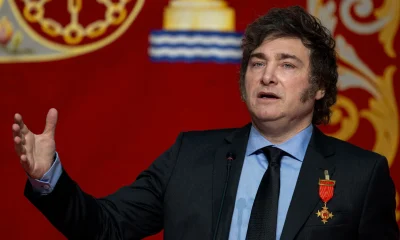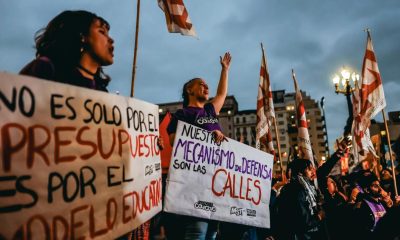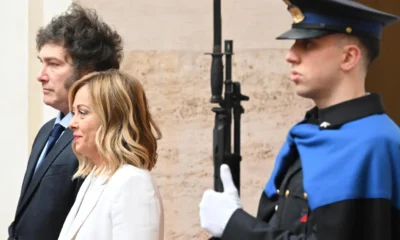International
Justice in Argentina suspends President Javier Milei’s labor reform, but the government appeals and doubts about its validity grow
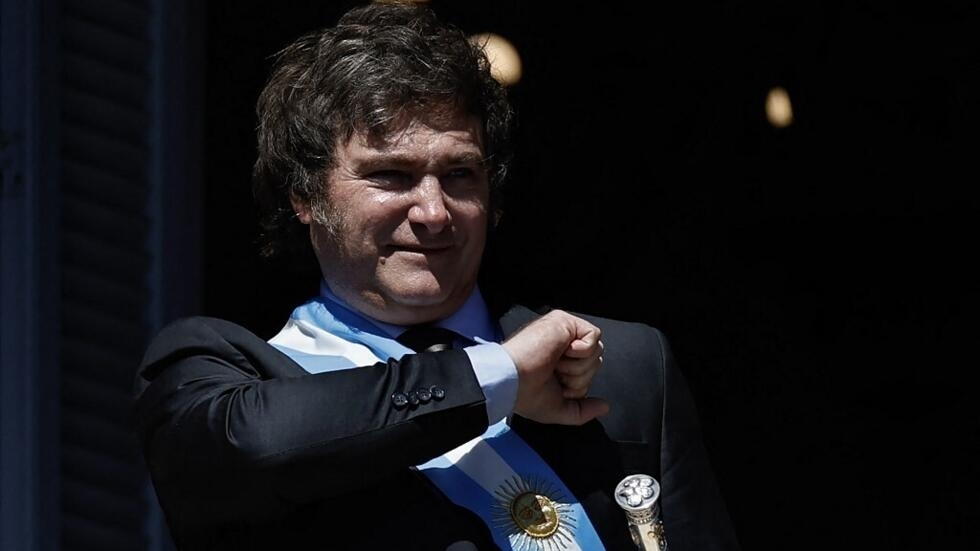
In Argentina, an appeals court suspended the labor reform contained in President Javier Milei’s decree of necessity and urgency (DNU) No. 70/2023. While the government prepares to appeal the decision, the execution of measures related to the labor aspect included in the decree is temporarily halted.
The Labor Appeals Chamber considered that “the ‘necessity’ of adopting so many measures would not be objectively evident,” according to the document signed by two judges of the Chamber, José Alejandro Sudera and Andrea García Vior. A third magistrate, María Dora González, dissented, stating that the court does not have jurisdiction, and the case should be transferred to the administrative litigation court.
The ruling states that there are no reasons alleged that constitute an urgency “to avoid the proper intervention of the Legislative Power regarding substantive legislation.” The tribunal cited the Constitution emphatically: “The National Constitution does not allow choosing discretionary between passing a law or imposing certain material contents more quickly through a decree.”
Now, what does the labor chapter of DNU 70/2023, currently suspended by the justice, establish? Regarding this, there are two main issues that have generated controversy:
- 8-month probation period The DNU extends the probationary period in an indefinite-term employment contract from 3 to 8 months, stating that “it will be considered probationary during the first 8 months of validity.” Additionally, the decree states that “either party may terminate the relationship during that period, without cause and without the right to compensation.”
Labor lawyer Alexander Rodríguez sees this point of the decree as a solution that “should be positive, as it encourages the entry of workers.” According to him, “companies do not hire personnel justifying that labor law is too demanding. So, instead of facilitating the entry of workers, their exit is facilitated. If the probation period is extended, there would be no fines for undeclared work or withheld contributions. Therefore, if you want more staff, you should facilitate entry, not exit.”
In contrast, labor lawyer Leandro Recalde argues that “the probationary period is a time granted to the employer to assess the suitability of the employee and gives them the possibility to terminate the employment relationship once that period is over, without the possibility of paying compensation.” Recalde asks, “How much time is really necessary to assess the employee’s suitability? What they are trying to do with this decree is distort that probationary period to eliminate or degrade the compensatory institute.”
- Severance pay Milei’s DNU states: “In cases of dismissal without just cause by the employer, with or without prior notice, and after the probationary period has elapsed, the employer must pay the worker severance pay equivalent to one month’s salary for each year of service or fraction exceeding 3 months, taking as a basis for calculation the best monthly, normal, and habitual remuneration earned during the last year or during the time of service if less.”
In this regard, Recalde considers that the basic objective of the DNU is to “lower the amount of severance pay.” In this aspect, he emphasized: “The DNU reduces the compensation by attacking how the remuneration or the calculation base for compensation is calculated. That is, if the Labor Contract Law took the best monthly, normal, and habitual remuneration, the DNU excludes the Christmas bonus, semi-annual and annual bonuses, and, in the case of variable remuneration, the best remuneration is not taken, but an average.”
Labor Secretary Omar Yasin declared weeks ago on the news channel La Nación + (LN+) that the DNU “is truly an instrument to generate employment” and that “it does not reduce any worker’s rights.” Regarding severance pay, Yasin argued that the DNU includes “an objective cause for dismissal, which is participating in a block against an employer, causing damage to the employer, the company, or third parties, and, fundamentally, preventing a worker from going to his workplace and not adhering to the strike.”
A topic that has generated controversies and disagreements among different representatives of labor law has to do with the unemployment fund. In statements to LN+, Yasin stated that “another positive aspect of the DNU is the possibility of creating an unemployment fund or termination fund.” As the head of the Labor Secretary established, the termination fund is created by collective agreement. The worker will turn to that fund if dismissed to immediately collect compensation without delay.
“The most serious thing that the decree provides is the possibility that through collective bargaining, unions and business chambers can repeal the compensation system and create series funds that do not adequately protect against dismissal,” argues Recalde. From another perspective, labor lawyer Alexander Rossi maintains that the indemnity resolution by collective agreement “does not make sense” because each business and union sector will have its own agreement.
Yasin also stated that the new DNU generates compensation for discriminatory dismissal, considering sexual, ethnic, or religious orientation. In this regard, the head of the Labor Secretary argued that, in these cases, compensations increase by 50% or 100%, according to judges.
Hours after the news of the suspension of the labor reform included in the DNU became known, it was reported that the State would appeal the precautionary measure. According to a source from the Ministry of Justice of the Nation, the presentation was being prepared by the Treasury Solicitor’s Office of the Nation, led by Rodolfo Barra, a former judge of the Supreme Court. In this regard, the Ministry argues: “They are ignoring the criterion adopted by all other courts in the country, both in the city and in the interior, which sent the case to the natural and universal judge.”
Barra said this Wednesday in an interview on Radio con vos that “the National Labor Appeals Chamber has a bias identified with some sectors that could have been affected by the DNU, which acted outside its jurisdiction.” The Treasury Solicitor anticipated that they will take the discussion first “in the administrative litigation court,” and if they are not successful, they will go to the Supreme Court.
Now, is the precautionary measure annulled with the appeal? For labor law specialist Jorge Fontán, the State required a “reconsideration appeal” for the same appeals chamber to review the precautionary measure. In this way, Fontán explained, “After the review, that appeal goes to the Supreme Court.” The Supreme Court will deal with all precautionary measures, but when the judicial recess or vacation, during which judicial activities cease between January 1 and 31 in Argentina, ends. In fact, the court that granted the precautionary measure is a holiday court. So, as Fontán said, the Supreme Court will deal with all precautionary measures when the judicial recess ends. In this way, given that the precautionary measure does not have a suspensive effect, it remains in force according to Fontán.
For labor lawyer Alexander Rodríguez, there are two scenarios: on the one hand, the decree remains suspended until the Supreme Court says otherwise. On the other hand, “A direct presentation of the Executive Power to the Supreme Court is possible, to immediately resolve the issue due to institutional gravity.”
International
Bolivia Orders Three Investigations Into Deadly Military Plane Crash
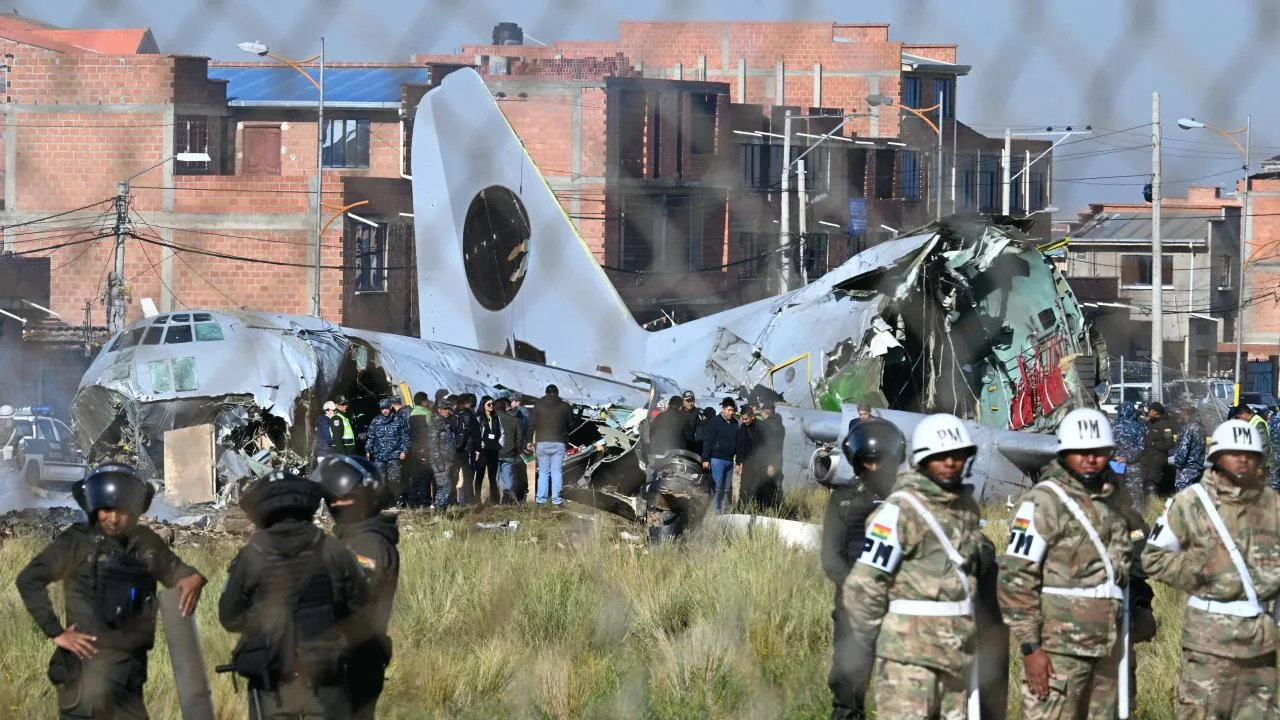
Bolivia’s Defense Minister Marcelo Salinas announced Monday that three separate investigations will be conducted into Friday’s crash of a military cargo aircraft at El Alto International Airport, near La Paz, which left at least 22 people dead.
The Hercules aircraft, operated by the Fuerza Aérea Boliviana (FAB), was transporting cash intended for the Central Bank of Bolivia when it overshot the runway after landing from the city of Santa Cruz. The plane reportedly traveled nearly one kilometer beyond the airport perimeter.
The incident sparked chaotic scenes, with individuals attempting to collect scattered banknotes. Authorities detained 51 people in the aftermath, and the government declared three days of national mourning.
Multiple Investigations Underway
The first inquiry is being led by a military board from the Bolivian Air Force, which has already taken custody of the aircraft’s black box for analysis.
Minister Salinas said two additional investigations will follow — one conducted by the insurance company and another by the aircraft’s manufacturer.
“At least two more investigations will come, that of the insurance company and that of the aircraft manufacturer,” Salinas said during a press conference in Santa Cruz.
He cautioned that the investigative process could take between three and six months, noting that the black box cannot be opened in Bolivia due to the lack of specialized laboratories for analysis.
Awaiting Official Findings
Salinas stressed that the FAB investigative board is the highest authority in the case and urged the public to wait for its conclusions to avoid speculation about the causes of the crash.
He also confirmed that the government has contacted the families of the 22 victims and the 37 injured, as well as the owners of 15 damaged vehicles, to coordinate procedures with the insurer and cover the corresponding expenses.
International
Mexico Calls for Immediate Probe After National Dies in ICE Custody
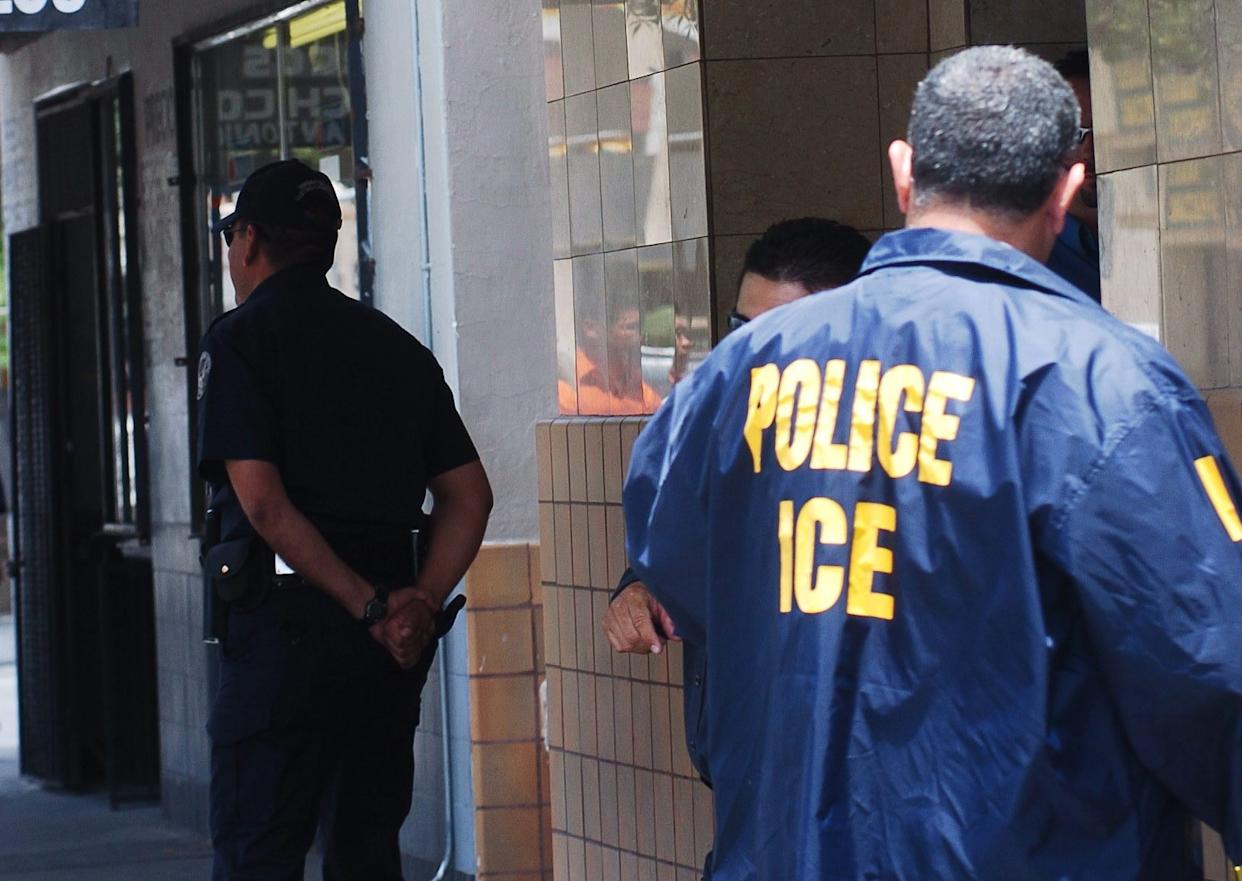
Mexico’s Secretaría de Relaciones Exteriores (SRE) on Monday called on U.S. authorities to conduct an “immediate and thorough” investigation into the death of a Mexican national while in custody of U.S. Immigration and Customs Enforcement (ICE) at a processing facility in California.
In a statement, the Mexican government described the death as “regrettable” and urged U.S. officials to clarify the circumstances surrounding the case in order to “determine responsibilities and ensure that such events do not happen again.”
Death at Adelanto Processing Center
According to available information, the Mexican citizen died at the Adelanto Processing Center in California while under ICE custody. Authorities have not yet released the individual’s identity or the cause of death.
Following the incident, Mexico’s Foreign Ministry formally requested “detailed information” from U.S. authorities, including the detainee’s medical records and custody reports.
Consular Assistance Activated
The Mexican Consulate in San Bernardino, California, has activated consular assistance protocols to provide ongoing support to the deceased’s family. Officials have contacted relatives to express condolences and offer legal guidance, as well as assistance with the necessary procedures to repatriate the remains.
“The handling of situations like this and the establishment of mechanisms to resolve them are priorities for the Government of Mexico,” the Foreign Ministry said, adding that it will formally request an investigation into any systemic conditions that may have contributed to such incidents.
Local Mexican media reported that seven Mexican nationals died while in ICE detention last year — the highest number recorded since the agency was created.
International
Anti-ICE Billboard Campaign Targets Immigration Spending in 31 U.S. Cities

More than 200 billboards criticizing U.S. Immigration and Customs Enforcement (ICE) began appearing Monday in 31 cities across the United States, including Miami, as part of a campaign highlighting the high cost of immigration enforcement operations for taxpayers.
The initiative, titled “ICE Costs Us,” was launched by the civil rights organization Mijente and will run for four weeks.
Criticism of Spending and Enforcement Tactics
The billboards feature images of ICE agents during arrests or carrying military-style weapons. According to the organization, spending on military-grade equipment for the agency has increased by 600 percent in recent years.
Several signs display messages such as:
“Your taxes are being wasted” and “ICE’s cruelty costs you $28 billion,” referring to the agency’s annual budget.
In a statement, Marisa Franco, co-founder of the Mijente Support Committee, said:
“For too long, our government has prioritized building cages and investing billions in an immigration enforcement apparatus that has left families torn apart and communities terrified.”
She added that “Millions of Americans are living paycheck to paycheck, yet this violent agency continues operating with a blank check. These decisions do not make us safer nor improve our economic security. Our billboards highlight these choices and demand a different path.”
Budget Debate and Medicaid Comparison
The campaign also draws a comparison between ICE’s funding and the estimated 17 million people who could lose health coverage under Medicaid due to federal budget cuts under President Donald Trump.
Other billboard messages seen in various cities include:
“They get billions to beat us; we get layoffs and rising rents” and “Funding ICE is a fast track to fascism.”
Organizers say the goal is to spark public debate about the allocation of federal funds for immigration enforcement and the broader economic and social impact of such policies on communities nationwide.
-

 International4 days ago
International4 days agoCocaine Production Surges 34% in 2023 as Market Expands into Africa and Asia
-

 International1 day ago
International1 day agoIran Reports 201 Dead, 747 Injured After U.S. and Israeli Strikes
-

 International3 days ago
International3 days agoTrump Floats “Friendly Takeover” of Cuba Amid Rising Tensions
-

 Sin categoría2 days ago
Sin categoría2 days agoTrump: ‘We Think It’s True’ Amid Claims Iran’s Supreme Leader Was Killed
-

 International2 days ago
International2 days agoSecurity Council to Hold Emergency Meeting on Middle East Crisis
-

 International4 days ago
International4 days agoFederal Judge Blocks Trump Policy Allowing Deportations to Third Countries
-

 International3 days ago
International3 days agoArgentina’s Senate Reviews Milei-Backed Labor Overhaul
-

 International1 day ago
International1 day agoPope Leo XIV Urges End to ‘Spiral of Violence’ in Middle East
-

 International4 days ago
International4 days agoClinton Accuses Republican Committee of Using Epstein Case to Shield Trump
-

 International4 hours ago
International4 hours agoAnti-ICE Billboard Campaign Targets Immigration Spending in 31 U.S. Cities
-

 International4 hours ago
International4 hours agoTrump Warns of ‘Major Wave’ of Attacks as Iran Conflict Escalates
-

 International5 hours ago
International5 hours agoBrazil’s Supreme Court Rejects Bolsonaro’s Bid for House Arrest
-

 International4 hours ago
International4 hours agoMexico Calls for Immediate Probe After National Dies in ICE Custody
-

 International4 hours ago
International4 hours agoBolivia Orders Three Investigations Into Deadly Military Plane Crash
-

 Central America4 hours ago
Central America4 hours agoPanama Canal Monitoring Trade as Middle East Conflict Disrupts Shipping



























